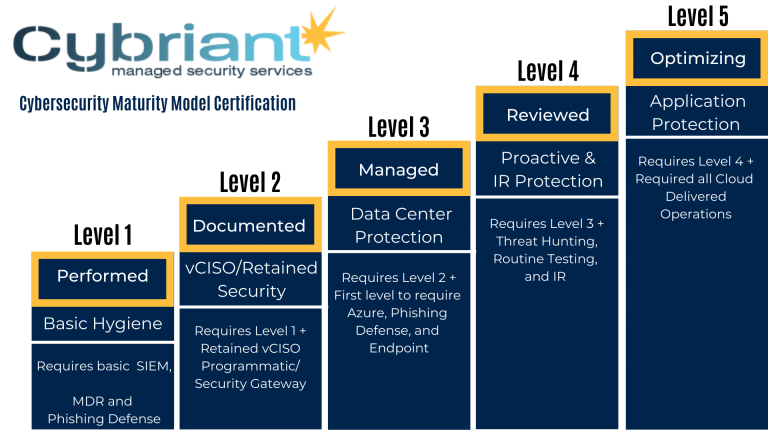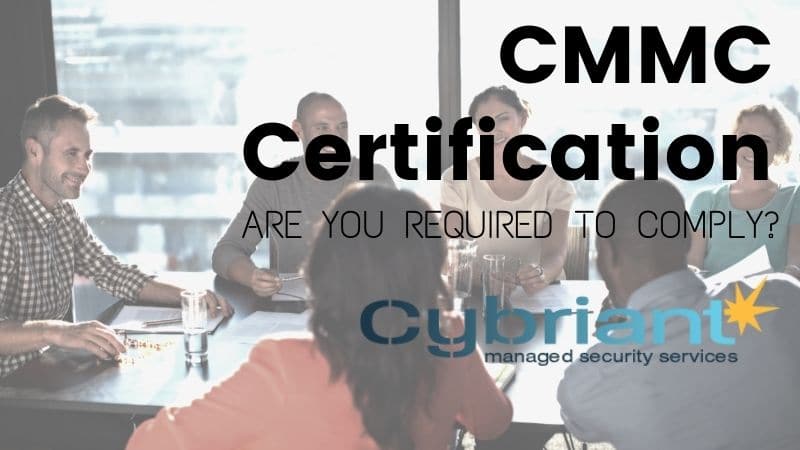Who Needs CMMC Certification? You may have heard about the upcoming CMMC certification requirement. Will your organization require certification?
The first question most organizations have regarding CMMC is: Who must comply with the CMMC? The short answer is all DoD contractors. But there may be more to the story, keep reading to find out.
Any cyber attack leading to the loss of Controlled Unclassified Information (CUI) from the Defense Industrial Base (DIB) poses a significant risk to national security.
With many companies and organizations doing business with the Department of Defense (DOD), the defense industrial database is one of the most frequent and valuable targets for malicious cyber activities. For this reason, DoD rolled out Cybersecurity Maturity Model Certification (CMMC). At its core, CMMC is a certification standard aiming to tighten cybersecurity protocols and reduce vulnerability to possible cyberattacks.
The CMMC certification is a seal that increases the security and resiliency of the DIB. Organizations that comply with the robust CMMC requirements will have played their role in improving national security.
In this article, you will learn more about Cybersecurity Maturity Model Certification, who needs the certifications, how to know if your organization needs to be certified, and other related information. Keep scrolling!
Related: How a Cyber Security Maturity Model Protects your Business
What is Cybersecurity Maturity Model Certification?
Cybersecurity Maturity Model Certification (CMMC) is a program rolled out by the DoD to unify standards for implementing cybersecurity across DIB. Essentially, it protects the information and data on all DoD networks while improving overall cybersecurity.
CMMC certification comes at a time when attempts to attack DoD systems are extremely high. Besides ensuring contractors observe appropriate levels of cybersecurity controls, this initiated certification will measure the readiness, capabilities, and sophistication of contractors in the cybersecurity area. For a contractor to be awarded any federal contract, they must meet minimum standards. This will significantly guarantee information and data protection while ensuring the integrity of the supply chain.
The primary goal of CMMC is to improve and ensure the safeguarding of sensitive data, including Controlled Unclassified Information (CUI) and Federal Contract Information (FCI) associated with federal contractors.
The CMMC framework
Featuring five certification levels, the CMMC framework consists of a comprehensive and scalable certification element to reflect the maturity and reliability of a contractor’s cybersecurity infrastructure. The five levels are tiered and built upon the technical requirements of each other. You must at least comply with lower-level requirements and institutionalize different processes to implement cybersecurity practices of a higher level.

Various levels in the CMMC certification framework demonstrate a collection of best cyber security-based practices used by organizations. The degree of adherence showcases an organization’s commitment to improving domain in maturity models for higher performance.
From basic cyber hygiene to higher aptitude levels and advanced security operations, CMMC builds upon existing frameworks and standards to create one maturity model. Here is an overview of the processes and practices of individual levels.
Level 1: Basic Cyber Hygiene
This is a foundational and minimum CMMC certification level. It is centered around protecting FCI, government information not intended for public release. Primarily, it requires an organization to use antivirus software and sanitize or destroy media featuring FCI before disposal.
Level 2: Intermediate Cyber Hygiene
At this level, contractors are expected to establish and document information on the best cybersecurity practices and policies. During the evaluation, a contractor or company should have an approach encompassing all activities to protect any CUI.
Level 3: Good Cyber Hygiene
With level 3 certification, a company or contractor showcases the essential ability to safeguard CUI and effectively implement NIST SP 800-171 security requirements. At this level, a company is required to resource and maintain a management plan to implement specific activities to protect CUI. A contractor needs to review policies and processes while ensuring activities are sufficiently maintained.
Level 4: Proactive
This is the second-highest certification level. The level includes establishing proactive practices to enhance detection and response to evolving tactics, techniques, and procedures of advanced persistent threats (APTs). These advanced cybersecurity practices can defend CUI from long-term malicious attacks aimed to mine sensitive information.
Level 5: Advanced/ Progressive
The highest certification level. Level 5 certification entails protecting CUI from APTs through more sophisticated techniques and capabilities to detect and respond to APTs. To be certified, organizations must implement standardized and optimized processes across the organization.
CMMC certification is a requirement for many government contractors. It will also be a good way to show that your company is serious about cybersecurity. The certification process can be long and expensive, but it will be worth it in the end.
There are many different aspects of CMMC certification, but one of the most important is making sure that your company has the proper security measures in place. This includes things like firewalls, intrusion detection systems, and data encryption. All of these things will help to keep your company’s data safe from hackers and other cyber threats.
Another important aspect of cmmc certification is making sure that your employees are trained in cybersecurity. This means that they know how to spot a threat and how to respond to it. It also means that they know how to use the tools that you have in place to protect your data.
CMMC certification is not something that you can do overnight. It will take time and effort to get everything in place, but it will be worth it in the end. If you are serious about protecting your company’s data, then you need to get cmmc certified.
CMMC requirements will vary from company to company, but there are some basic things that all companies will need to do. One of the most important is to have a security policy in place. This policy should be reviewed and updated regularly so that it stays up-to-date with the latest threats.
What is CMMC Certification?
The CMMC is a unified certification standard that will be required by the U.S. Department of Defense (DoD) for all contractors who wish to do business with them. The CMMC replaces the current DoD 8570.01-M Information Assurance Workforce Improvement Program and DoD 8140.01 Cybersecurity Workforce Framework.
The CMMC certification standardizes the cybersecurity maturity levels required by contractors across five domains:
- Asset Management
- Security Governance
- Access Control
- Information Protection Processes and Procedures
- Incident Response and Recovery
How to Get CMMC Certification?
CMMC certification requirements include implementing security controls and processes across all five domains. The level of maturity required for each domain will be based on the type of work the contractor will be performing for the DoD.
To achieve CMMC certification, contractors should assess their current cybersecurity posture using the Cybersecurity Maturity Model Certification Self-Assessment Guide (CMMC-SA). This guide will help contractors identify gaps in their security controls and processes. Once these gaps have been identified, contractors can begin working to implement the necessary security controls and processes to meet the CMMC requirements for their specific domain and level.
It is important to note that there is no one-size-fits-all solution for implementing security controls and processes. What works for one company may not work for another. It is up to each contractor to tailor their security controls and processes to meet the specific needs of their business.
The CMMC-AB can provide assistance and resources for contractors who are working to implement the CMMC requirements. The CMMC-AB website includes a list of Registered Providers who can provide training, assessments, and consulting services.
The CMMC-AB also offers the Certified Assessor Body Program which provides assessors with the tools and resources they need to assess contractors for CMMC compliance.
CMMC Ecosystem
The CMMC ecosystem includes the following:
- The Cybersecurity Maturity Model Certification (CMMC) Institute
- The Cybersecurity Maturity Model Certification Accreditation Body (CMMC-AB)
- Registered Providers
- Certified Assessor Bodies
- Contractors
The CMMC ecosystem works together to provide the resources and support needed for contractors to implement the CMMC requirements.
The CMMC Institute is responsible for managing the CMMC program. The CMMC-AB accredits Registered Providers and Certified Assessor Bodies. Registered Providers offer training, assessments, and consulting services to help contractors implement the CMMC requirements. Certified Assessor Bodies assess contractors for CMMC compliance. Contractors are required to implement the CMMC requirements to do business with the DoD.
The CMMC ecosystem is designed to support the success of the CMMC program. By working together, the members of the ecosystem can provide the resources and support needed for contractors to implement the CMMC requirements and achieve CMMC certification.
CMMC Readiness Assessment
Consider a CMMC assessment from Cybriant to assess your level of readiness. Contact us to learn more.
Who needs CMMC Certification?
The first question most organizations have regarding CMMC is: Who must comply with the CMMC? The short answer is all DoD contractors.
CMMC applies to anyone in the defense contract supply chain. These include contractors who engage directly with the Department of Defense and subcontractors contracting with primes to fulfill and/or execute those contracts.
According to the DoD, the CMMC launched standards that will affect over 300,000 organizations. Thankfully, most companies will need between level 1 to level 3 certification to be eligible for government contracts. The affected organizations include all suppliers at all tiers along the DoD supply chain, commercial items contractors, small businesses, and foreign suppliers.
Coordination between DoD and CMMC Accreditation Body (CMMC-AB) develops procedures to certify independent third-party assessment organizations (C3PAO) and assessors. These assessors evaluate companies’ CMMC levels. The exact level of certification a company needs to be awarded a federal contract will be specified in the RFP. All the same, contractors doing business with DoD must at least meet Level 1 CMMC requirements.
Organizations will get appropriate certification upon satisfying the security requirements for a specifically requested tier. All CMMC assessors are licensed through CMMC-AB; therefore, guaranteeing the finding of your cybersecurity audit remains confidential. Nevertheless, your level of certification will be available to DoD through a database.
So, how do you know if you need to be certified? If you’re a contractor working with DoD or a subcontractor executing DoD projects, you need CMMC certification.
What are some of the CMMC Best Practices?
Although CMMC will likely be fully implemented by 2026, companies and organizations should start certification efforts earliest possible. Essentially, this involves putting in place the best cyber security-based practices.
The rate at which a company achieves an acceptable level of cyber hygiene and ultimately complies with CMMC requirements depends on the current environment. Here are some of the CMMC best practices.
- Determine the CMMC level you need to obtain, review cyber hygiene requirements, and start gathering CMMC tools, documents, and templates.
- Identify the scope of the evaluation and configure the existing security environment to align with CMMC requirements.
- Review each CMMC practice against your environment, starting with the first practice in the first domain and working way down.
- Continually visit the DoD’s website to check any updates on CMMC as you wait for assessment by CMMC-AB certified assessor.
CMMC Readiness Assessment
Prepare today for the Cybersecurity Maturity Model Certification with our CMMC Readiness Assessment and Gap Analysis.
Our experts will determine where your gaps are and what you need to do to remediate them. After completing a thorough gap analysis we will provide you with a documented Plan of Action so that you can develop a roadmap toward eventual CMMC certification.
How To Become CMMC Certified
To become CMMC-certified, organizations must first understand the requirements and guidelines set by the Cybersecurity Maturity Model Certification (CMMC) framework. This includes identifying the level of certification required for their specific business needs and ensuring that they meet the necessary security standards and requirements.
Next, organizations must undergo an assessment by a CMMC Third-Party Assessor Organization (C3PAO) to verify that they meet the required security controls for their desired level of certification. The review includes a thorough evaluation of the organization’s cybersecurity policies, procedures, and practices, as well as testing of their information systems and network security.
Upon completing the assessment, the C3PAO will provide a certification of compliance, which verifies that the organization meets the requirements for the desired level of CMMC certification. This certificate can then be shared with customers and partners to demonstrate the organization’s commitment to cybersecurity and information assurance.
It is important to note that CMMC certification is an ongoing process, as organizations must maintain their compliance with the framework and undergo periodic assessments to ensure continued adherence to the required security controls. Additionally, organizations must ensure that their supply chain partners also meet the necessary security standards to avoid any potential security risks or breaches.
CMMC Certification Guidelines
The Cybersecurity Maturity Model Certification (CMMC) framework is a set of guidelines and requirements that organizations must follow to achieve certification. The framework is designed to ensure that organizations are adequately protecting their sensitive information and data against cyber threats. CMMC certification guidelines are categorized into five levels, ranging from basic cybersecurity hygiene to advanced security measures.
Level 1 certification is the most basic level and requires organizations to implement basic cybersecurity practices such as password management and network security. Level 2 certification introduces a more comprehensive security program, including documentation of policies, procedures, and plans. The organization must also implement additional security controls to protect sensitive information.
Level 3 and above require organizations to have an advanced security program, including continuous monitoring and regular vulnerability assessments. Organizations must also have processes in place to respond to cybersecurity incidents and implement two-factor authentication.
One of the most critical aspects of CMMC certification is the third-party assessment. Organizations must undergo an assessment by a CMMC Third-Party Assessor Organization (C3PAO) to verify their compliance with the framework’s guidelines and requirements. The C3PAO will conduct an audit of the organization’s cybersecurity policies, procedures, and practices, as well as test their information systems and network security.
Organizations must maintain their compliance with the framework to retain certification. Therefore, they need to undergo periodic CMMC assessments to ensure their adherence to the required security controls and implement updates, modifications, or additional security measures.
Meeting the CMMC certification guidelines requires a dedicated effort and commitment to cybersecurity. Organizations need to ensure that their supply chain partners also meet the necessary security standards to avoid potential security risks. Achieving certification helps companies demonstrate to customers and partners their commitment to maintaining robust cybersecurity and information assurance practices.
What CMMC Level Do I Need?
To achieve CMMC compliance, organizations should carefully evaluate which level of certification they need based on their business needs and contracts with the Department of Defense. The DoD will specify the level of certification required in the request for information (RFI) or request for proposal (RFP) process.
For example, if an organization intends to bid on a contract that involves handling controlled unclassified information (CUI), it may need a higher level of certification than if they were only providing general IT services.
It is important to note that even if an organization does not currently require a particular level of certification, it may need to in the future. Therefore, it is recommended that organizations adopt a proactive approach to cybersecurity and information assurance and aim for a higher level of certification than is strictly required.
In Conclusion
CMMC is a unified standard to safeguard information and data from all DoD systems while ensuring the supply chain’s integrity. Unlike NIST SP 800-171, which requires contractors to take solid measures towards compliance, CMMC compliance includes assessments that assign a company maturity level. It is a no-brainer that CMMC is more than NIST SP 800-171 and will ensure all DoD contractors protect CUI as required. Prepare today with the Readiness Assessment from Cybriant.



